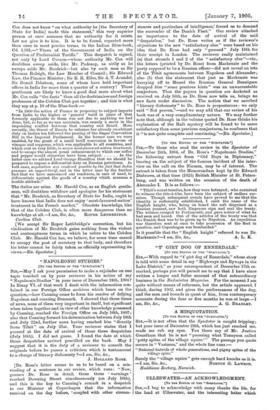[To TEE EDITOR OF THE "SPECTATOR."]
Slit,—May I ask your permission to make a rejoinder on one topic touched on by your reviewer in his notice of my "Napoleonic Studies" in your issue of December 24th, 1904? In Essay VI. of that work I dealt with the information con- tained in our Foreign Office archives which bears on the question,—how Canning came to form his resolve of defying Napoleon and coercing Denmark. I showed that three items of news, none of them very important in itself, but significant when taken together and in view of other knowledge possessed by Canning, reached the Foreign Office on July 16th, 1807; also that Canning formed his determination between July 16th and July 22nd, further news having reached him "directly from Tilsit" on July 21st. Your reviewer states that I guessed at the date of arrival of those three despatches (July 16th). I did not guess. I found the date at which those despatches arrived pencilled on the back. May I suggest that it is the duty of a reviewer to consult the originals before he passes a criticism which is tantamount to a charge of literary dishonesty P-1 am, Sir, &c., J. HOLLAND ROSE.
[Dr. Rose's letter seems to us to be based on a mis- reading of a sentence in our review, which runs : "Now, guesses Dr. Rose in detail, these three 'warnings' reached Downing Street simultaneously (on July 16th), and this is the key to Canning's remark in a despatch to our Minister at Copenhagen that the information received on the day before, coupled with other circum- stances and particulars of intelligence,' forced us to demand the surrender of the Danish Fleet." Our review attached no importance to the date of arrival of the said "despatches," but Dr. Rose writes as if the reviewer's objections to the new "satisfactory clue" were based on his idea that Dr. Rose had only " guessed " July 16th for their receipt in London. The reviewer really maintained (a) that strands 1 and 2 of the "satisfactory clue "—viz., the letters (printed by Dr. Rose) from Mackenzie and the party supposed to be a Russian officer—did not reveal an iota of the Tilsit agreements between Napoleon and Alexander; also (b) that the statement that just as Mackenzie was hurrying off to Memel the Russian General Bennigsen dropped him "some precious hints" was an unwarrantable conjecture. That the papers in question are docketed as received on July 16th, as Dr. Rose now tells us, brings no new facts under discussion. The notion that we ascribed "literary dishonesty" to Dr. Rose is preposterous : we only said "Not proven,"—and we may add that our review of his book was of a very complimentary nature. We may further note that, although in the volume quoted Dr. Rose thinks his explanation of the Raft mystery will be found to be more satisfactory than some previous conjectures, he confesses that it "is not quite complete and convincing."—En. Spectator.]














































 Previous page
Previous page